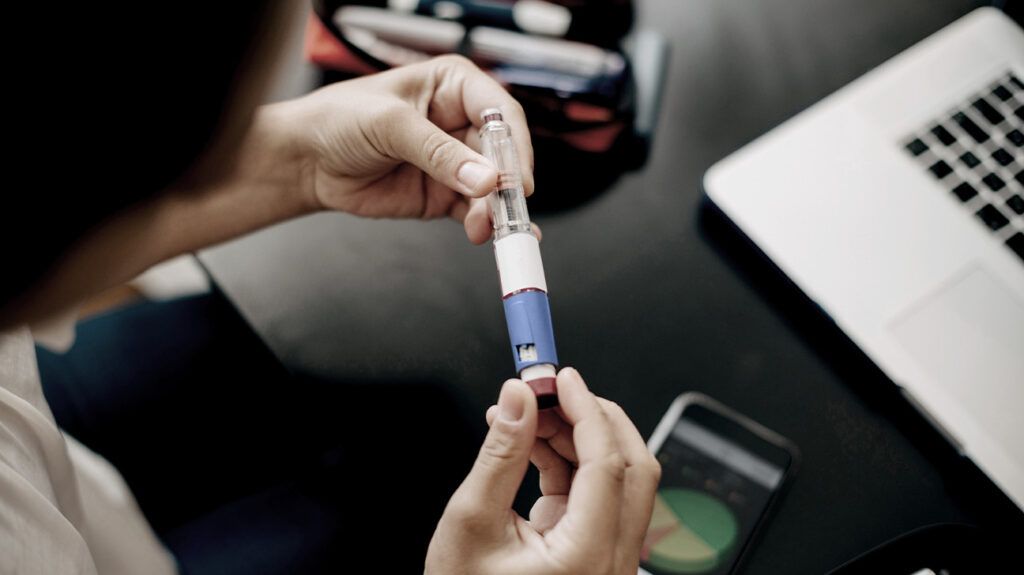
- Psoriatic arthritis (PsA) is a common and difficult-to-treat condition that often occurs with psoriasis.
- The drug company UCB recently developed a new PsA treatment called Bimzelx.
- Bimzelx appears to be effective even in individuals who have not previously responded to treatment.
- The drug is now approved in multiple countries, most recently Japan.
Psoriatic arthritis (PsA) is an immune-mediated musculoskeletal condition that affects around 30% of people with a history of psoriasis.
The main symptoms are pain, swelling, and stiffness in one or more joints as well as swollen fingers or toes, nails changing color, small pits in nails, and the feeling of being drained of energy.
The condition can impact people’s quality of life and their day-to-day activities.
When someone develops PsA, doctors usually initially prescribe conventional synthetic disease-modifying antirheumatic drugs (
However, if these do not work well, the doctor may switch to (or add) biologic DMARDs, such as tumour necrosis factor-alpha inhibitors (TNFi-IR). These drugs are highly specific and target a particular immune system pathway to reduce inflammation.
While these drugs often relieve symptoms and slow the disease’s progress, not everyone responds to the current drugs and even those who do are often
Pharmaceutical company UCB recently brought a new option called Bimzelx (bimekizumab) to market.
Some experts hope this drug will be useful for people who do not respond well to other available treatments.
Medical News Today spoke with Dr. Maham Khan, a consultant dermatologist at the Cadogan Clinic. She explained that diagnosing PsA early and starting the right treatment can improve disease outcomes.
“Early treatment is associated with a reduced risk of joint damage and deformities. This can contribute to improved joint function and mobility over the long term,” Khan explained.
“Initiating treatment early helps in better control of symptoms such as joint pain, swelling and stiffness. This can enhance the overall quality of life for individuals with PsA,” she added.
Having multiple effective drugs available could help people get the treatment they need at an earlier stage.
Interleukin-17 (IL-17) is a group of pro-inflammatory cytokines that scientists know play a crucial role in both psoriasis and PsA.
Bimzelx is a monoclonal antibody that selectively inhibits two members of the IL-17 family: IL-17A and IL-17F.
These cytokines are produced from the same immune cells. Scientists believe they are particularly important in driving the damaging inflammation associated with PsA.
Research has shown that IL-17A and IL-17F are both overexpressed in the skin and joints of people with psoriasis and PsA. Bimzelx is the first approved PsA treatment that selectively blocks both IL-17A and IL-17F.
In two Lancet papers that were published in tandem, UCB scientists put Bimzelx to the test.
The first study, called
The second study,
In both studies, researchers said the participants who were given Bimzelx had significantly better results than the people who were given a placebo.
They said the drug reduced signs and symptoms of PsA and stopped structural damage. Alongside clinical measures, participants self-reported improvements in physical function, pain, and fatigue.
They said the results of the BE COMPLETE study are promising for individuals for whom first and second-line drugs have failed. Bimzelx gives these individuals another treatment option. Also of note, the study showed that the drug’s beneficial effects became apparent after just 4 weeks.
In addition, the magnitude of the positive effects in both studies was similar. This suggests that Bimzelx treatment may produce a similar magnitude of clinically meaningful improvements in PsA, regardless of previous treatment with biologics.
The study authors explained that this is encouraging because people who do not respond favorably to the first course of biologics often do not respond to a second one.
Importantly, they said, the overall safety profile of Bimzelx was consistent with previous studies on existing drugs.
A review published in January 2024 assessed Bimzelx’s performance against other available psoriasis and PsA treatments.
This work is important because, the authors explained, “direct comparative data are limited,” making it challenging to know which drug to start treatment with.
They found that Bimzelx had superior efficacy for treating both PsA and psoriasis. Also, the safety profile of the new drug was similar to existing treatments.
It should be noted that this review was fully funded by UCB.
Bimzelx is now approved for use in people with PsA in the European Union, the United Kingdom, and, most recently, Japan.
According to a UCB press release, other countries, including Australia, Canada, Switzerland, and China, are also considering approving this drug.
One of the greatest challenges of treating PsA is catching the condition early. As it stands, there are no biomarkers for the condition.
Medical News Today spoke with Oliver Fitzgerald, a consultant rheumatologist and a professor at University College Dublin in Ireland.
He is helping organize a multi-site study called HPOS, which aims to discover clinical measures to identify PsA before it can cause damage.
If successful, Fitzgerald said, the earlier diagnosis could help new drugs such as Bimzelx reduce the damage caused by PsA even further.
